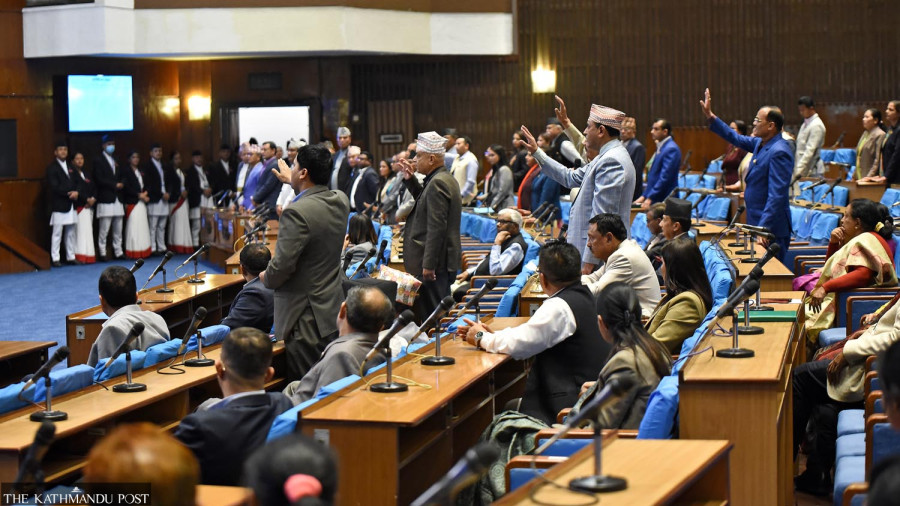Politics
Parliament’s winter session ends without passing crucial bills
The legislatura failed to endorse federal civil service and school education bills, which are necessary for a full-fledged implementation of the constitution.
Post Report
The winter session of the federal parliament has been prorogued without endorsing crucial bills necessary for the full-fledged implementation of the Constitution of Nepal.
President Ramchandra Paudel, under the Cabinet’s recommendation, ended the session starting Tuesday midnight. According to the Parliament Secretariat, the House of Representatives had a total of 27 meetings that lasted 118 hours and 21 minutes during the session that lasted 61 days. The session commenced on January 31.
While 13 bills including a private bill were registered during the session, five bills, some of which were pending from the previous sessions, and the same numbers of replacement bills of the ordinances were endorsed by the federal parliament. However, it failed to endorse crucial bills like federal civil service and school education. Both the laws are necessary for the full-fledged implementation of the constitution.
“Endorsing the ordinances and replacement bills alone is not enough,” said Nepali Congress lawmaker Arjun Narsingh KC. “The winter session was ineffective. It failed to endorse important federal civil service and school education bills.”
The school teachers, who hit the streets demanding endorsement of the school education bill, have announced to start mass show starting Wednesday as the House session was prorogued without meeting their demands.
“We have called teachers to Kathmandu for the protest that begins tomorrow [Wednesday],” said Laxmi Kishore Subedi, chair of Teachers’ Federation Nepal. “It will continue until our demand is met.”
The federation announced the protests ignoring the call from the Education, Health and Information Technology Committee of the lower house. On Monday Chhabilal Bishwakarma, coordinator of the education committee under the House committee, had urged the teachers to call off their protest saying the bill would be addressed after proper deliberations.
“We are aware of the agreements the government has repeatedly sealed with the federation,” he had said. “We are serious about the issues raised and are positive about addressing them.”
Currently, the sub-committee is holding discussions over the bill at the provincial level.
The subpanel has received mutually conflicting suggestions on several issues including teacher management. As the constitution lists school education as absolute authority of the local government, local units want school teachers to fall under their jurisdiction. However, teachers don’t want to stay under local authorities, claiming there are high chances that the local governments will treat them based on the political leanings of the local governments.
On different occasions, the federal government has agreed with the teachers to keep them under the federal government.
The federation has said their protest will commence at 1 pm on Wednesday and end at 4 in the afternoon. It will be held at the same time on Thursday and onwards. This is the second time in less than two years the teachers are hitting the streets in the federal capital demanding a law.
Right after the government introduced the bill in the federal parliament in September 2023, the federation staged a Kathmandu-centric agitation objecting to different provisions in the bill. Thousands of teachers staged protests in Kathmandu, disrupting life in the capital city and forcing the government into a dialogue.
They withdrew the protest after sealing a six-point deal with the government, which promised to address their demands by revising the bill. The teachers are preparing for similar protests.
Enactment of the Act is a must to implement the Constitution of Nepal which can delegate most of the authority to manage the education sector at the local and provincial levels. However, almost a decade after the constitution came into force, the country is yet to formulate the Act.




 21.87°C Kathmandu
21.87°C Kathmandu














